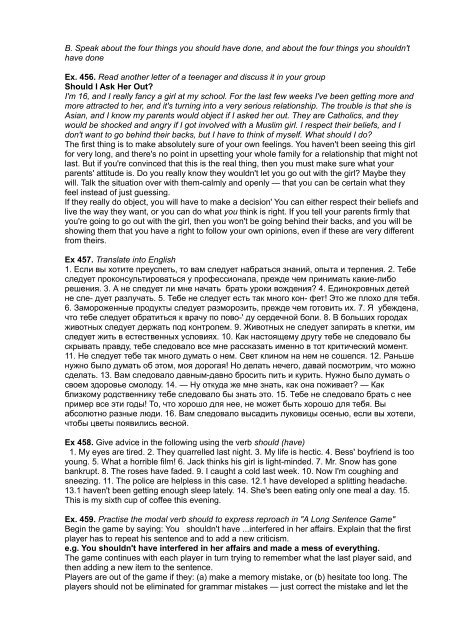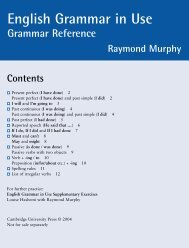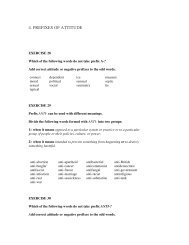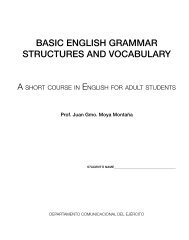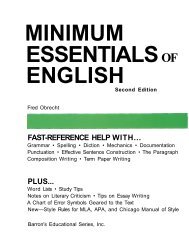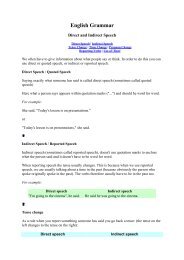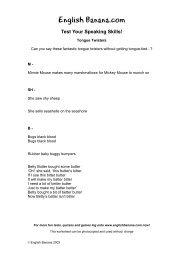Exercises in Modern English Grammar - ESL Teachers Board
Exercises in Modern English Grammar - ESL Teachers Board
Exercises in Modern English Grammar - ESL Teachers Board
Create successful ePaper yourself
Turn your PDF publications into a flip-book with our unique Google optimized e-Paper software.
B. Speak about the four th<strong>in</strong>gs you should have done, and about the four th<strong>in</strong>gs you shouldn't<br />
have done<br />
Ex. 456. Read another letter of a teenager and discuss it <strong>in</strong> your group<br />
Should I Ask Her Out?<br />
I'm 16, and I really fancy a girl at my school. For the last few weeks I've been gett<strong>in</strong>g more and<br />
more attracted to her, and it's turn<strong>in</strong>g <strong>in</strong>to a very serious relationship. The trouble is that she is<br />
Asian, and I know my parents would object if I asked her out. They are Catholics, and they<br />
would be shocked and angry if I got <strong>in</strong>volved with a Muslim girl. I respect their beliefs, and I<br />
don't want to go beh<strong>in</strong>d their backs, but I have to th<strong>in</strong>k of myself. What should I do?<br />
The first th<strong>in</strong>g is to make absolutely sure of your own feel<strong>in</strong>gs. You haven't been see<strong>in</strong>g this girl<br />
for very long, and there's no po<strong>in</strong>t <strong>in</strong> upsett<strong>in</strong>g your whole family for a relationship that might not<br />
last. But if you're conv<strong>in</strong>ced that this is the real th<strong>in</strong>g, then you must make sure what your<br />
parents' attitude is. Do you really know they wouldn't let you go out with the girl? Maybe they<br />
will. Talk the situation over with them-calmly and openly — that you can be certa<strong>in</strong> what they<br />
feel <strong>in</strong>stead of just guess<strong>in</strong>g.<br />
If they really do object, you will have to make a decision' You can either respect their beliefs and<br />
live the way they want, or you can do what you th<strong>in</strong>k is right. If you tell your parents firmly that<br />
you're go<strong>in</strong>g to go out with the girl, then you won't be go<strong>in</strong>g beh<strong>in</strong>d their backs, and you will be<br />
show<strong>in</strong>g them that you have a right to follow your own op<strong>in</strong>ions, even if these are very different<br />
from theirs.<br />
Ex 457. Translate <strong>in</strong>to <strong>English</strong><br />
1. Если вы хотите преуспеть, то вам следует набраться знаний, опыта и терпения. 2. Тебе<br />
следует проконсультироваться у профессионала, прежде чем принимать какие-либо<br />
решения. 3. А не следует ли мне начать брать уроки вождения? 4. Единокровных детей<br />
не сле- дует разлучать. 5. Тебе не следует есть так много кон- фет! Это же плохо для тебя.<br />
6. Замороженные продукты следует разморозить, прежде чем готовить их. 7. Я убеждена,<br />
что тебе следует обратиться к врачу по пово-' ду сердечной боли. 8. В больших городах<br />
животных следует держать под контролем. 9. Животных не следует запирать в клетки, им<br />
следует жить в естественных условиях. 10. Как настоящему другу тебе не следовало бы<br />
скрывать правду, тебе следовало все мне рассказать именно в тот критический момент.<br />
11. Не следует тебе так много думать о нем. Свет клином на нем не сошелся. 12. Раньше<br />
нужно было думать об этом, моя дорогая! Но делать нечего, давай посмотрим, что можно<br />
сделать. 13. Вам следовало давным-давно бросить пить и курить. Нужно было думать о<br />
своем здоровье смолоду. 14. — Ну откуда же мне знать, как она поживает? — Как<br />
близкому родственнику тебе следовало бы знать это. 15. Тебе не следовало брать с нее<br />
пример все эти годы! То, что хорошо для нее, не может быть хорошо для тебя. Вы<br />
абсолютно разные люди. 16. Вам следовало высадить луковицы осенью, если вы хотели,<br />
чтобы цветы появились весной.<br />
Ex 458. Give advice <strong>in</strong> the follow<strong>in</strong>g us<strong>in</strong>g the verb should (have)<br />
1. My eyes are tired. 2. They quarrelled last night. 3. My life is hectic. 4. Bess' boyfriend is too<br />
young. 5. What a horrible film! 6. Jack th<strong>in</strong>ks his girl is light-m<strong>in</strong>ded. 7. Mr. Snow has gone<br />
bankrupt. 8. The roses have faded. 9. I caught a cold last week. 10. Now I'm cough<strong>in</strong>g and<br />
sneez<strong>in</strong>g. 11. The police are helpless <strong>in</strong> this case. 12.1 have developed a splitt<strong>in</strong>g headache.<br />
13.1 haven't been gett<strong>in</strong>g enough sleep lately. 14. She's been eat<strong>in</strong>g only one meal a day. 15.<br />
This is my sixth cup of coffee this even<strong>in</strong>g.<br />
Ex. 459. Practise the modal verb should to express reproach <strong>in</strong> "A Long Sentence Game"<br />
Beg<strong>in</strong> the game by say<strong>in</strong>g: You shouldn't have ...<strong>in</strong>terfered <strong>in</strong> her affairs. Expla<strong>in</strong> that the first<br />
player has to repeat his sentence and to add a new criticism.<br />
e.g. You shouldn't have <strong>in</strong>terfered <strong>in</strong> her affairs and made a mess of everyth<strong>in</strong>g.<br />
The game cont<strong>in</strong>ues with each player <strong>in</strong> turn try<strong>in</strong>g to remember what the last player said, and<br />
then add<strong>in</strong>g a new item to the sentence.<br />
Players are out of the game if they: (a) make a memory mistake, or (b) hesitate too long. The<br />
players should not be elim<strong>in</strong>ated for grammar mistakes — just correct the mistake and let the


